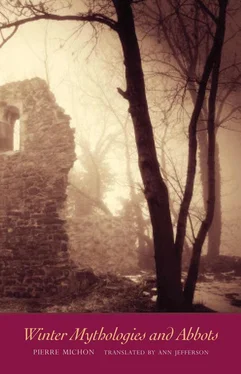The wine is wickeder. It is absolute like the king. Wine made him take the white cockade and put his scythe together back to front.
They reach La Capelle. They enter the village. From each house, from behind each stone wall, and from under each tree there emerge the blue uniforms with the red trimmings of the one and indivisible republic. It’s the Bleus. They have cavalry. They have a superintendent with a tricolor sash who gives orders in the language that is spoken in Paris. The forty-seven men surrender without a fight: the wine has drained away, abandoned them in the June sunshine, and without the wine they suspect that the republic is not the only cause of grim poverty. Antoine Persegol feels as if a great burden has been lifted from him.
They are parked in a small sloping field with stone walls. The roll is called, then they are left for a while, with a Bleu posted at every second stone along the wall. They do not speak. Antoine Persegol tells himself that everything will be straightened out, since the republic loves the truth, and the truth is that he loves the republic. Truth is the mother of freedom. The truth will appear, and this evening he’ll be free; he’ll see his mother. He can see the superintendent with the sash walking to and fro beneath the elm tree on the square, a lad his own age with worn hands like those of the carders. He looks like a decent fellow. He loves the unfortunate, that’s for sure. Antoine Persegol walks up to the wall to get a better view of him: he’ll signal to him and the other man will come over; he’ll talk to him, and they will patiently allow the truth to emerge between them, lovely and indubitable like the tricolor silk. A Bleu roughly pushes him away; he goes back and sits down. Toward evening, carts arrive. As they are being led away he finds himself by chance in front of the superintendent. He says in patois that he’d been drunk and that he loves the republic. “What’s this scoundrel saying?” asks the superintendent in the language that is spoken in Paris. The sergeant shrugs his shoulders, and the superintendent turns away. They are loaded into carts and taken to Florac. So now he will explain everything in Florac, and he’ll see his mother tomorrow.
The reality is otherwise. Reality is a cruel stepmother. The next morning at Florac five men sitting in black hats speak in an incomprehensible language to forty-seven men standing before them. They are pushed into the June day with their hands tied. On the cart he thinks about his mother standing in the June day on the doorstep of her house in La Malène, looking toward the far end of the empty track. The huge machine with the swift bevel is set up on the square in Florac. Forty-seven times the iron blade of Mother Death severs a head from a trunk, forty-seven times a head severed from a trunk violently confirms the law of falling bodies. Antoine Persegol is the fortieth.
At Le Rozier on the River Tarn and the River Jonte, where the three major causses meet — Sauveterre, Méjan, and Noir—Édouard Martel is sitting on the terrace of the Hôtel des Voyageurs. It’s September. He is in his prime; he’s about to succeed in life, and he knows it: that is what he is telling himself on this sunny terrace in September, between the vast sky above and the sparkling waters below. He proudly contemplates September. He holds his head high with its fine Roman features and blond goatee. He is one of those men who love glory. He has abandoned the sad profession of scribe at the court of law in Paris; it seemed to him that for a man of his caliber the profession of explorer was the shortest path to glory; it also seemed to him that the surface of the earth, the ground on which you walk beneath the sun, was too easy a terrain for the explorer’s quest, too obvious and somehow duplicitous: he has taken the darker part of exploration, the caves and the chasms, Erebus and Tartarus, the kingdom of the dead. Within this kingdom he is searching for his own, like Dante or Orpheus. He has founded speleology. A hundred feet below ground he has created a reputation for himself.
He loves the causse where this reputation originated when he discovered Dargilan ten years back. He is looking for other holes. He has made the Hôtel des Voyageurs his headquarters, like his African colleagues, the discoverers in pith helmets, who pitch their tents in Timbuktu or Zanzibar and from there gather information about the desert in the North, the forest in the West, send out patrols and wait for the dry season. The shepherds from the causse know the man with the blond goatee who has a liking for the Underworld, and sits with his legs crossed under the arbor on the terrace waiting for them to bring him news of the Underworld: if the earth opens up under a lamb, or if a stone dropped down a shaft is swallowed up without a sound, they come running to the Hôtel des Voyageurs and talk to the blond goatee with the crossed legs clad in gaiters. And on this very day, September 18, a man who has news of the Underworld is walking into the village of Le Rozier.
It’s Louis Armand, the locksmith. He is now under the arbor. He is full of a feverish joy. He says that on the causse between Nabrigas and La Parade there is a low entrance; the stones thrown into it drop the devil of a way down. “Well then, let’s go to the devil,” says the blond goatee with a laugh. As soon as he has been up to his room and fetched ropes, pegs, carabiners, helmets, and lamps they’re off.
Until the end of September the terrace is deserted. Or it seems that way because, although are there are a few drinkers in the afternoon — shepherds or carders, and a few passing horse dealers — the tall blond figure whom glory has brushed with its wing and who gives meaning to other men is no longer there. Autumn reigns alone; Martel does not see it. He is beneath the earth; he is exploring, mapping and measuring the most enormous hole he has ever seen. A hundred feet below ground he is tasting pure happiness.
In October, Martel, now somewhat paler, is sitting under the arbor. It’s a beautiful day again, and very hot. There are pens and an inkpot on the table, a blotter, and several sheets of paper which flutter in the wind like the leaves on the hornbeam above his head. All morning Martel has been lining up figures, calculating contour lines; he has sketched cross-sections, scale drawings; he has made a portrait of the chasm: the first hole, the enormous sloping nave with its stalagmites, the second hole lower down which is like a duplicate chasm. He contemplates the drawings with a sense of vertigo. Suddenly he lifts his head: the hotel owner’s wife is serving aperitifs to the short-stay guests and looking tenderly at the proud profile and the blond goatee. She doesn’t know that Édouard Martel wants to die. She doesn’t know that he is saying to himself, “None of this has the slightest meaning. It’s just a hole that slopes. These are just white stones rising up in the dark. The sun has never been here. It’s sinister. There’s nothing to see inside.” He stands up angrily, crumpling his papers as he takes them away. In the evening he gets drunk with Louis Armand. The hotel owner’s wife tenderly helps him upstairs to his room.
Later, on another day, he is once again under the arbor, which is at present quite bare. He has just been to the telegraph office, where he sent a cable to Paris, and he is now sitting down. He is calmer. At the top of the sheet that caused his despair the other day — the one with the scale drawings — he has carefully written in capital letters: Aven Armand , and under it in smaller letters: At La Parade Causse Méjan Lozère . He says to himself that it’s a good start. By the spot where the stalagmites are particularly bushy and numerous, he writes Great Forest; he immediately crosses this out and writes Virgin Forest , and then where they are all round and heaped on top of each other, The Jellyfish Corner . He goes through them, one by one, and against this or that stalagmite, he writes, The Grand Stalagmite (30 m), The Easter Candle, The Palm Tree, The Turkey, The Tiger . He can see very clearly in his mind’s eye the tall shapes as they appeared to him down below. He smiles: No, these are not white stones rising up pointlessly in the dark; they are objects full of meaning that have a name in men’s mouths. As he is making these observations to himself, the telegraph clerk arrives bringing him a reply from Paris. He reads it and exults. Without lifting his pen from the page, he writes under the drawings, The whole of Notre-Dame in Paris could be comfortably contained inside the large chamber . He rereads his words and tastes pure happiness. He says to himself that the profession of scribe is a fine one. He strokes his blond goatee.
Читать дальше











